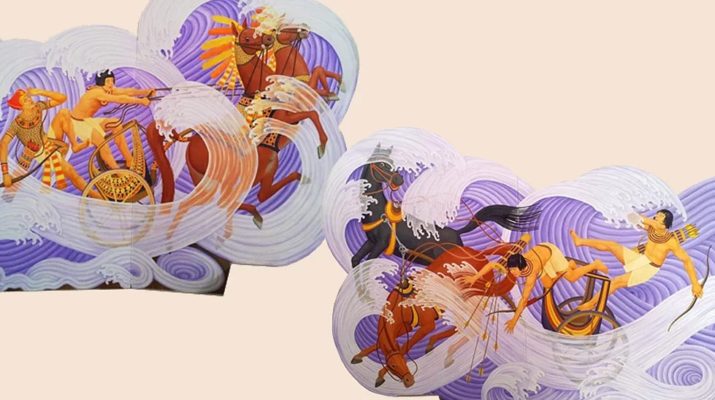Exodus 15:1b-13, 17-18
Easter Vigil A
1 Then MosesI and the IsraelitesII sangIII this songIV to the Lord:V
I “Moses” = Mosheh. From mashah (to pull out in a literal or figurative sense, to draw out) OR from Egyptian mes or mesu (child, son i.e. child of…). This is Moses – the one drawn out from the water, which is to say, rescued. If derived from the Egyptian, his name would share a root with Rameses and Thutmose.
II “Israelites” = ben + Yisrael. Literally, “children of Israel.” Ben is from banah (to build or obtain children). This is son, age, child. It is son in a literal or figurative sense. Yisrael is from sarah (to persist, exert oneself, contend, persevere, wrestle, prevail) + el (God or god). This is Israel, meaning God strives or one who strives with God; new name for Jacob and for his offspring. This refers to the people and to the land.
III “sang” = shir. From shir (song, singer). This is to sing. It could also refer to one who is singing or leading others in song.
IV “song” = shir. Related to “sang” in v1. See note III above.
V “Lord” = YHVH. From havah (to be, become) or hayah (to come to pass, become, be). This is the name of the God of Israel, the self-existent and eternal one, the tetragrammaton. This pronunciation has been lost to time so “Lord” is generally used in its place.
“I will sing to the Lord, for he has triumphed gloriously;VI
horseVII and riderVIII he has thrownIX into the sea.X
VI “triumphed gloriously” = gaah + gaah. This is to rise up, be exalted, triumph. Figuratively, it can mean to be majestic. The word is repeated twice – the first time as an Infinitive Absolute. The Infinitive Absolute serves to emphasize the sentiment of the word. It is rather like Foghorn Leghorn’s speech pattern, “I said, I said.”
VII “horse” = sus. Root may mean to skip as in jump for joy. This is a crane or a swift bird. It is also a horse as leaping.
VIII “rider” = rakab. This is to ride an animal or in some vehicle. It can also mean bringing on a horse.
IX “thrown” = ramah. 13x in OT. This is to hurl, shoot, carry, or throw. Figuratively, it is to beguile, delude or betray. It can also refer to an archer.
X “sea” = yam. Root may mean to roar. This is the sea, often referring to the Mediterranean. It comes from the root in the sense of the roar of crashing surf. This word is sometimes used for rivers or other sources of water. It can mean to the west or to the south.
2 The LordXI is my strengthXII and my might,XIII
and he has becomeXIV my salvation;XV
XI “Lord” = Yah. Related to “Lord” in v1. From YHVH (see note V above). This is Lord or God – a shortened form of God’s most holy name.
XII “strength” = oz. From azaz (to be strong, become fixed, be bold, prevail, be impudent; it means to be stout literally or figuratively. A Late Hebrew word). This is strength in the sense of force, majesty, praise, material and physical strength, the abstract notion of security. It can also speak of social or political power.
XIII “might” = zimrath. 3x in OT. From the same as zimrah (melody, psalm, or sound; sung to praise God or a song sung with an instrument); from zamar (making music; used specially of music to worship God; music with singing, singing praise, singing psalms); may be from zamar (to trim or prune). This is a song or instrumental music. It implies a song of praise.
XIV “become” = hayah. Related to “Lord” in v1 & “Lord” in v2. See note V above.
XV “salvation” = yeshuah. From yasha (to deliver, defend, help, preserve, rescue, be safe. Properly, to be open, wide or free, which implies being safe. Used causatively, it means to free). This is salvation, deliverance, health, victory, prosperity.
this is my God,XVI and I will praiseXVII him,
my father’sXVIII God,XIX and I will exaltXX him.
XVI “God” = El. Related to “Israelites” in v1. See note II above.
XVII “praise” = navah. 2x in OT. This is to dwell, abide, or beautify. It is rest like one rests at home. It can also mean celebrate with praises.
XVIII “father’s” = ab. This is father, chief, or ancestor. It is father in a literal or figurative sense.
XIX “God” = Elohim. Related to “Israelites” in v1 & “God” in v2. See note V above.
XX “exalt” = rum. This is to rise or raise, to be high literally or figuratively. So it can also mean to exalt or extol.
3 The LordXXI is a warrior;XXII
the LordXXIII is his name.XXIV
XXI “Lord” = YHVH. Same as “Lord” in v1. See note V above.
XXII “warrior” = ish + milchamah. Literally, “man of war.” Ish is perhaps from enosh (human, humankind, mortal); from anash (to be weak, sick, or frail). This is man, husband, another, or humankind. Milchamah is from lacham (to eat or feed on; figuratively, to battle as a kind of consumption/destruction). This is battle, war, fighting, or one who fights (i.e. a warrior).
XXIII “Lord” = YHVH. Same as “Lord” in v1. See note V above.
XXIV “name” = shem. May be from sum (to put, place, set). This is name, fame, renown. A name was thought to indicate something essential about a person – something about their individuality. So, this word can also mean honor, authority, or character.
4 “Pharaoh’sXXV chariotsXXVI and his armyXXVII he castXXVIII into the sea;
XXV “Pharaoh’s” = paroh. From Egyptian pr (palace, pharaoh; literally house + great). This is Pharaoh, a title for Egyptian kings. See https://en.wiktionary.org/wiki/pharaoh
XXVI “chariots” = merkabah. Related to “rider” in v1. From merkab (chariot, saddle, covering; any seat in a vehicle); from rakab (see note VIII above). This is a chariot.
XXVII “army” = chel. From chul (whirling around so dancing as in a circle or writhing in pain; used particularly for the pain of childbirth or from writhing due to fear; can also be falling in pain or waiting) OR from chayil (strength, wealth, ability, activity; a soldier or a company of soldiers; goods; a force of people, means, or goods; valor, virtue, or strength); from chul (to be firm, strong, prosperous; to endure). This is an army, entrenchment, fortress, wall, or host.
XXVIII “cast” = yarah. This is to throw, shoot, be stunned. It is to flow as water so figuratively to instruct or teach. This is the same root that “Jerusalem” and “Torah” draw from.
his pickedXXIX officersXXX were sunkXXXI in the RedXXXII Sea.
XXIX “picked” = mibchar. 13x in OT. From bachar (to choose, appoint, try, excellent). This is select, choice, the best, select, the best people.
XXX “officers” = shaliysh. 17x in OT. From shalosh (three, fork, triad). This is literally a third. So, it could refer to some kind of musical instrument like a triangle or a lute with three strings. It could also refer to a triple measure. Additionally, it could be a highly ranked person like a captain, lord, or prince.
XXXI “sunk” = taba. 10x in OT. This is sink, drown, settle, or fasten.
XXXII “Red” = suph. Perhaps from Egyptian twfi (reeds). This is reeds or rushes. It can be used particularly to refer to papyrus, or a flag. This is https://www.abarim-publications.com/Dictionary/sa/sa-p-pfin.html#.XzHCuChKhPY
5 The floodsXXXIII coveredXXXIV them;
they went downXXXV into the depthsXXXVI like a stone.XXXVII
XXXIII “floods” = tehom. Perhaps from hum (to roar, murmur, cause an uproar, agitate; to defeat in battle, destroy). This is the deep or the abyss. Either understood as a formless empty place of nothingness or as a place of confusion filled with water – the deep the feeds the waters of the earth.
XXXIV “covered” = kasah. This is to cover, conceal, overwhelm. It is to cover as clothes do or to hide a secret.
XXXV “went down” = yarad. This is to go down, descend; going down in a literal or figurative sense. It can be going to the shore or a boundary, bringing down an enemy.
XXXVI “depths” = metsolah. 11x in OT. From the same as tsulah (root may mean to sink; ocean depths, the abyss of the sea). This is depth, bottom, or otherwise somewhere deep that is watery or muddy.
XXXVII “stone” = eben. This is a stone, weight, or mason. It is part of the word “Ebenezer.”
6 Your right hand,XXXVIII O Lord,XXXIX gloriousXL in powerXLI—
your right hand, O Lord,XLII shatteredXLIII the enemy.XLIV
XXXVIII “right hand” = yamin. May be from yamam (to go or choose the right, use the right hand; to be physically fit or firm). This can mean right hand, right side, or south. Since most people are right-handed, the metaphorical usage of this word presumes that the right hand is stronger and more agile. Thus, it is the instrument of power and action.
XXXIX “Lord” = YHVH. Same as “Lord” in v1. See note V above.
XL “glorious” = adar. 3x in OT. This is wide, glorious, honorable, great, magnificent. Properly, it is to expand.
XLI “power” = koach. Root may mean to be firm. This is power, strength, force. It can be literal or figurative, positive or negative. It can also mean capacity or means – what something produces. Additionally, it could refer to some kind of small reptile.
XLII “Lord” = YHVH. Same as “Lord” in v1. See note V above.
XLIII “shattered” = raats. 2x in OT. This is to break in pieces, shatter, crush, or figuratively to afflict.
XLIV “enemy” = oyeb. From ayab (to hate or be hostile to). This is a foe or enemy as one that you are hostile to.
7 In the greatnessXLV of your majestyXLVI you overthrewXLVII your adversaries;XLVIII
XLV “greatness” = rob. From rabab (to be or become much or many, multiply). This is any kind of abundance.
XLVI “majesty” = ga’own. Related to “gloriously” in v1. From the same as ga’avah (majesty, excellency, pride, arrogance, ornament); from gaah (see note VI above). This is majesty, pride, redemption, pomp, excellency, swelling, or arrogance.
XLVII “overthrew” = haras. This is to break down, throw down, ruin, overthrow, or destroy. It is breaking down in pieces.
XLVIII “adversaries” = qum. To arise, stand, accomplish, establish, abide. This is rising as in rising against, getting up after being sick or asleep, arising from one state to another, becoming powerful, or rising for action. It can also be standing in a figurative sense.
you sent outXLIX your fury,L it consumedLI them like stubble.LII
XLIX “sent out” = shalach. This is to send out, away, send for, forsake. It can also mean to divorce or set a slave free.
L “fury” = charon. From charah (to be displeased, burn with anger, glow, become warn; figuratively a blaze of anger, zeal, or jealousy). This is burning anger, fierceness, or wrathfulness.
LI “consumed” = akal. This is to eat, devour, burn up, or otherwise consume. It can be eating in a literal or figurative sense.
LII “stubble” = qash. 16x in OT. Perhaps from qashah (this is to gather stubble or forage for it, to gather, straw or wood; figuratively, to gather people, assemble). This is dry straw, chaff, stubble.
8 At the blastLIII of your nostrilsLIV the watersLV piled up,LVI
LIII “blast” = ruach. This is breath, wind, air, cool, spirit. This is wind, which resembles the breath and so this can be used figuratively for life itself or being frail/mortal/impermanent. It can refer to the air of the sky or the spirit.
LIV “nostrils” = aph. From anaph (to be angry; properly, breathing hard as a signifier of being enraged). This properly refers to the nose or nostril and by extension the face. It can specifically refer to anger or wrath as one breathes hard and nostrils flare in times of great anger.
LV “waters” = mayim. This is water, waters, or waterway in a general sense. Figuratively, it can also mean juice, urine, or semen.
LVI “piled up” = aram. 1x in OT. This is to heap or gather together.
the floodsLVII stood upLVIII in a heap;LIX
the deepsLX congealedLXI in the heartLXII of the sea.
LVII “floods” = nazal. 16x in OT. This is to drip or flow, pour down, flood, distill, or melt.
LVIII “stood up” = natsab. This is to station, appoint, establish, take a stand.
LIX “heap” = ned. 6x in OT. From nud (to nod, waver, wander, flee, show grief, disappear; nodding the head as a sign of sympathy or consolation; tossing one’s head to show contempt or to taunt). This is a heap or mound – it can imply a wave.
LX “deeps” = tehom. Same as “floods” in v5. See note XXXIII above.
LXI “congealed” = qapha. 4x in OT. This is to shrink, thicken, condense, congeal, or curdle. It can refer to freezing water, curdling milk, or clouding skies.
LXII “heart” = leb. May be related to labab (to encourage; properly, to be encased as with fat; used in a good sense, this means to transport someone with love; used in a bad sense, it can mean to dull one’s senses). This is the heart, courage, one’s inner self, the mind, or the will. Heart is only used in a figurative sense in the Old and New Testaments.
9 The enemy said, ‘I will pursue,LXIII I will overtake,LXIV
I will divideLXV the spoil,LXVI my desireLXVII shall have its fillLXVIII of them.
LXIII “pursue” = radaph. This is to chase after, pursue, hunt, or persecute. It is running after someone or something, generally with hostile motives.
LXIV “overtake” = nasag. This is to reach in a literal or figurative sense. It is to overtake, catch, or be able to.
LXV “divide” = chalaq. This is to be smooth in a figurative sense. So, it can refer to the stones that were part of casting lots – hence, apportion, share, distribute. Figuratively, it can also mean to flatter.
LXVI “spoil” = shalal. From shalal (to plunder, loot, capture). This is spoil, prey, or plunder.
LXVII “desire” = nephesh. Related to naphash (to refresh or be refreshed). This is soul, self, person, emotion. It is a breathing creature. Can also refer to appetites and desires.
LXVIII “have its fill” = male. This is fill, satisfy, replenish, accomplish, fulfill, confirm, or consecrate. It is fill in a literal or figurative sense.
I will drawLXIX my sword,LXX my handLXXI shall destroyLXXII them.’
LXIX “draw” = ruq. 19x in OT. This is to pour out in a literal or figurative sense. It can mean to arm, draw out, cast out, or empty.
LXX “sword” = chereb. From charab (to attack, slay). This is any sharp instrument like a sword, dagger, axe, or mattock.
LXXI “hand” = yad. This is hand, ability, power. Hand in a literal sense, but also what one can do or the means by which one does it.
LXXII “destroy” = yarash. This is inheriting or dispossessing. It refers to occupying or colonizing – taking territory by driving out the previous inhabitants and living there instead of them. By implication, it can mean to seize or rob, to expel, ruin, or impoverish.
10 You blewLXXIII with your wind,LXXIV the sea covered them;
they sankLXXV like leadLXXVI in the mightyLXXVII waters.
LXXIII “blew” = nashaph. 2x in OT. This is to blow like a breeze of fresh wind.
LXXIV “wind” = ruach. Same as “blast” in v8. See note LIII above.
LXXV “sank” = tsalal. 1x in OT. This is to be submerged or go downwards while waving back and forth.
LXXVI “lead” = ophereth. 9x in OT. From the same as opher (stag, fawn, hart); from aphar (to throw dust, be dust); from aphar (dust as powdered, perhaps gray colored; ashes, powder, ground, dry earth, clay mud, or rubbish). This is lead, the metal, since it is dust-colored.
LXXVII “mighty” = addir. Related to “glorious” in v6. From adar (see note XL above). This is majestic, excellent, mighty, powerful, or noble.
11 “Who is like you, O Lord,LXXVIII among the gods?LXXIX
Who is like you, majesticLXXX in holiness,LXXXI
LXXVIII “Lord” = YHVH. Same as “Lord” in v1. See note V above.
LXXIX “gods” = el. Same as “God” in v2. See note XVI above.
LXXX “majestic” = adar. Same as “glorious” in v6. See note XL above.
LXXXI “holiness” = qodesh. This is set apart and so sacred. God is different from us and so God is holy/set apart. Things we dedicate to God’s service are set apart for God and so they, too, are holy, etc.
awesomeLXXXII in splendor,LXXXIII doingLXXXIV wonders?LXXXV
12 You stretched outLXXXVI your right hand,
the earthLXXXVII swallowedLXXXVIII them.
LXXXII “awesome” = yare. This is to fear, be afraid, dreadful. It can also refer to fearful reverence – to fear in a moral sense is to say to revere, respect.
LXXXIII “splendor” = tehillah. From halal (to praise, be boastful). This is praise or a song of praise. It is to offer God a hymn, to boast in God. This shares a root with “hallelujah.”
LXXXIV “doing” = asah. This is to make, do, act, appoint, become in many senses.
LXXXV “wonders” = pele. 13x in OT. This is a wonder, marvelous thing, or a miracle.
LXXXVI “stretched out” = natah. This is to stretch or spread out, to extend, or bend. In can also imply moral deflection.
LXXXVII “earth” = erets. Root may mean to be firm. This is earth, ground, field land, or country.
LXXXVIII “swallowed” = bala. This is to swallow, engulf, cover, or destroy.
13 “In your steadfast loveLXXXIX you ledXC the peopleXCI whom you redeemed;XCII
you guidedXCIII them by your strength to your holy abode.XCIV
LXXXIX “steadfast love” = chesed. From chasad (being good, kind, merciful; may mean bowing one’s neck as is done in the presence of an equal for courtesy’s sake; so, if one in a superior position is treating you like an equal, that is what is captured here). This is favor, goodness, kindness, loving kindness, pity, reproach, or a good deed. When done by God to humanity, this is mercy/loving kindness. When done by humanity to God, it is piety.
XC “led” = nachah. This is lead, guide, or bring. It can be used for transporting into exile or coming in as colonists. This is the word used in Psalm 23 “he leads me in the paths of righteousness.”
XCI “people” = am. From amam (to darken, hide, associate; creating shadows by huddling together). This is people or nation. It can be used specifically for a tribe, collectively of troops or armies, or figuratively to refer to a flock of animals.
XCII “redeemed” = gaal. This is to redeem someone or something according to kinship laws. So, it could be acting on a relative’s behalf to buy back their property, to marry one’s brother’s widow, etc. This could be more briefly translated as to redeem, acts as kinsman, or purchase. As a noun, it could be deliverer or avenger.
XCIII “guided” = nahal. 10x in OT. This is leading or guiding – specifically to a resting place or somewhere where there is water. So, it can mean to refresh or feed, protect or sustain. The word itself carries a sense of flowing, sparkling water. This is the word used in Psalm 23 “he leads me beside still waters.”
XCIV “abode” = naveh. Related to “praise” in v2. From navah (see note XVII above). This is home, place where shepherd or sheep live. It is at home – implies a lovely place or a place of satisfaction. It can also be used for the Temple or a pasture as the home of wild animals.
17 You brought them inXCV and plantedXCVI them on the mountainXCVII of your own possession,XCVIII
XCV “brought…in” = bo. This is to enter, come in, advance, fulfill, bring offerings, enter to worship, attack. It can also have a sexual connotation.
XCVI “planted” = nata. To fix or fasten, establish or plant. This is planting in a literal or figurative sense.
XCVII “mountain” = har. From harar (hill or mountain). This is mountain, hill, hilly region.
XCVIII “possession” = nachalah. Related to nachal (to inherit, occupy, distribute, take as heritage). This is properly something that was inherited. It can mean occupancy generally or, more particularly, an heirloom or an estate. This can be an inheritance, gift, possession, or portion.
the place,XCIX O Lord,C that you madeCI your abode,CII
XCIX “place” = makon. 17x in OT. From kun (properly, in a perpendicular position; literally, to establish, fix, fasten, prepare; figuratively, it is certainty, to be firm, faithfulness, render sure or prosperous). This is a foundation, fixture, basis. It can also be a place or abode as somewhere that is established.
C “Lord” = YHVH. Same as “Lord” in v1. See note V above.
CI “made” = paal. This is to do, make, work, or accomplish. Generally refers to regularly repeated or systematic action – so, to practice.
CII “abode” = yashab. This is to sit and so to remain and so to dwell. It is sitting for any reason – as a judge, in order to ambush, or just sitting quietly. Causatively, this can mean settling or marrying. This can also mean continue, endure, or establish.
the sanctuary,CIII O Lord,CIV that your hands have established.CV
CIII “sanctuary” = miqdash. Related to “holiness” in v11. From the same as qodesh (see note LXXXI above). This is a sacred place, sanctuary, holy place. It is something or somewhere that is consecrated, whether to God or to another.
CIV “Lord” = YHVH. Same as “Lord” in v1. See note V above.
CV “established” = kun. Related to “place” in v17. See note XCIX above.
18 The LordCVI will reignCVII foreverCVIII and ever.”CIX
CVI “Lord” = YHVH. Same as “Lord” in v1. See note V above.
CVII “reign” = malak. To be or become king or queen, to rise to the throne, to be crowned. By implication, to take counsel. This word may be from the Hebrew word for king “melek” or vice versa.
CVIII “forever” = olam. This is a long scope of time whether in the past (antiquity, ancient time) or in the future (eternal, everlasting).
CIX “ever” = ed. From adah (to adorn, continue). This is eternity, old, a duration.
Image credit: “Drowning of Pharaoh’s Army” by Peter Koenig, 20th century.




